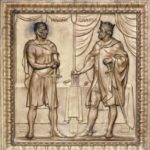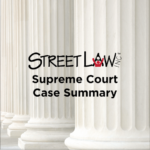Does the Illegal Immigration Reform and Immigrant Responsibility Act violate the due process clause by suspending habeas corpus or limiting access to the courts? This case summary shows how the Supreme Court answered that question in 2001.
Castle Rock v. Gonzales (2005)
Does a court-issued restraining order create a property interest which is protected by the Due Process Clause? This case summary shows how the Supreme Court answered that question in 2005.
Chavez v. Martinez (2003)
Is a suspect’s right against self-incrimination and to due process violated if he is subjected to coercive questioning while in custody, even if his statements were never used against him? This case summary shows how the Supreme Court answered that question in 2003.
Chicago v. Morales (1999)
Does a Chicago ordinance issued to lower the amount of gang activity through arrests of loiterers violate the Due Process Clause? This case summary shows how the Supreme Court answered that question in 1999.
Demore v. Kim (2003)
Does the Immigration and Nationality Act, requiring detention without bail of aliens, violate the right to due process? This case summary shows how the Supreme Court answered that question in 2003.
Caperton v. Massey (2009)
Should a state judge recuse himself from a case if one of the parties made financial contributions to the judge’s election campaign? This case summary shows how the Supreme Court answered that question in 2009.
HUD v. Rucker (2002)
Does HUD’s policy authorize a tenant to be evicted from public housing for the drug-related activity of a household member or guest? This case summary shows how the Supreme Court answered that question in 2002.
Missouri v. Seibert (2004)
Does an officer’s questioning prior to the recitation of a Miranda warning undermine the protection offered by the Fifth Amendment? This case summary shows how the Supreme Court answered that question in 2004.
Magna Carta: Cornerstone of the U.S. Constitution

Magna Carta served to lay the foundation for later declarations of rights in England and the United States. In attempting to establish checks on the king’s powers, this document asserted the right of “due process” of law. It also provided the basis for an idea of a “higher law,” one that could not be altered either by executive mandate or legislative acts. This concept, embraced by the leaders of the American Revolution, is embedded in the supremacy clause of the United States Constitution.
